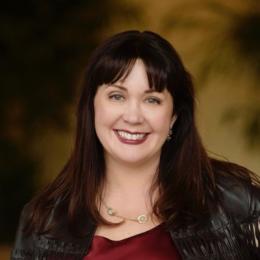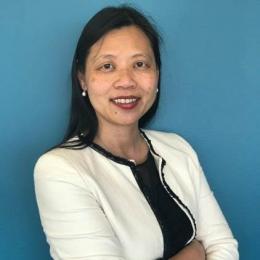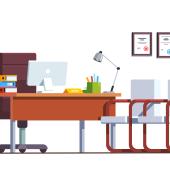I recently had the pleasure of sitting down with colleague and friend Minh Hoang Merchant, general counsel and secretary of Genome Medical, a genomics technology, services, and strategy company based in South San Francisco.
Amii: What a year it’s been! During the pandemic, has your legal team worked in a company office, worked from home, or a combination?
Minh: We have been remote the entire time! Our company is a telehealth-based company, so we have always had a distributed workforce, with many of our employees having traditionally been remote. That said, when I started at Genome Health, on March 9, I received a phone call from my CEO en route to the office on my first day, to turn around and head back home because a tenant in the building tested positive so they closed the building down. Little did I know then that we wouldn't re-open any time soon!
Amii: That’s amazing to be sent home on your first day — in what would turn out to be hundreds of such days working at home. In a remote environment, what do you find is the top leadership skill needed to work effectively as in-house counsel?
Minh: Open, transparent, and regularly cadenced communication (balanced with the possibility of Zoom fatigue)! Because the spontaneous water cooler conversation over a particularly new and thorny legal issue doesn't happen during a lockdown, we have to create channels to [foster those conversations] as organically as possible.
Amii: Have you hired new team members during the pandemic?
Minh: I have opened a new head count recently, but have held interviews (and commenced work) with people whom I have not yet met in person, including members of the C-suite. It has been a pretty seamless process, but I do miss the everyday, casual interactions that are the cornerstone for helping build confidence and trust, and are usually the precursor to raising new issues to tackle in an informal way.
Amii: Yes, that can be really tough to build the entire relationship remote, without those interpersonal cues that give us better information and give us an opportunity to build a closer relationship. With that new hire you’ll be seeking, what qualities will you be looking for?
Minh: I am focusing on versatility and nimbleness — someone who is adept at changes and curveballs. The pandemic posed all sorts of new and novel issues that lawyers have had to tackle, from work from home policies, to navigating through PPP and other government subsidies, to disability and sick leave policies for those affected by COVID-19, to vaccination policies. These novel issues require mental and intellectual agility and a growth mindset.
Amii: Those are critical qualities. I wrote an article for ACC on the 10 Skills Today’s In-house Counsel Need, and a VUCA (volatile, uncertain, complex, ambiguous) mindset and change management capabilities top the list. What tools do you use to communicate with your team?
Minh: We support Zoom at my company, and it has been a great way to stay connected in this virtual space. We also Slack for informal communications; select members of my team also text for a quick read or response to a situation. But, for more substantive communications, I rely on email.
Amii: Zoom has definitely taken the place of the office. Given we’re remote, what is one effective communication practice you’ve adopted?
Minh: If I am running a meeting, I always prepare an agenda. If I am participating, I make sure I have enumerated, clear, and concise points I want to convey, especially if the format is an open forum and there are a lot of people in the meeting. That way, I make sure my points are heard, discussed, and understood. I find this promotes efficiency and allows us to sometimes end a meeting early.
Amii: Excellent advice. Meeting agendas are a top strategy for running a meeting well, and ideally on time! Speaking of the challenges, in your experience, what one interpersonal behavior can lead to conflict in a remote work environment?
Minh: [Not having an] emotional quotient (EQ), or the capacity for self-awareness, self-regulation, control and expression of one’s emotions, and to handle interpersonal relationships judiciously and empathetically.
If you cannot read your audience well, the virtual interface really compounds that. And, when there are a number of people attending a meeting virtually, it can be quite chaotic if the person leading the meeting does not instill some sort of order and balance.
To compensate for that, people might talk over others or bulldoze into a discussion just so that they can be heard, or be less sensitive to intangible signals that we would otherwise be able to detect in person. Quite frankly, it's more challenging to "read the room" when the room is virtual.
Amii: It is much harder to read the room virtually. We miss so much information and knowing whether we are heard. As former Boston Celtics coach Red Auerbach said, “It’s not what you say, it’s what they hear.” We need to be much more intentional about following up or checking in to confirm what others are hearing vs. what we are saying. What is one habit you or your team has adopted to set healthy work/personal boundaries?
Minh: As a company, we have set Wednesday mornings as a meeting-free space. That really allows us to have uninterrupted time (setting aside children, partners, pets, etc.), and can help with a reset. We also host virtual happy hours, have sponsored virtual social events (like yoga and meditation), and, as we continue to grow our organization, we have tried to find ways to "get to know" our new work colleagues in a fun and informal fashion.
Amii: That is so wonderful, to have time in the middle of the work week with no meetings. You can get focused, get in a flow state to accomplish work and have space for strategic, long-term thinking. What one piece of advice would you give to other in-house counsel to navigate the transition back to work?
Minh: I think that the first phase of return to work will be rough. If we have children to drop off at school, there are a number of additional logistical steps to take to ensure their and others' safety and wellness. Similarly, when we return to work ourselves, there will be additional steps to take before we enter the premises, and we still will likely not be able to congregate in large numbers, which means we have to be facile about how to run meetings and how to meet with and support our teams. All these additional steps increase the mental load, but, as with all things we do every day, perhaps they will seem routine soon enough and second nature until we get to a point where they will be unnecessary.





